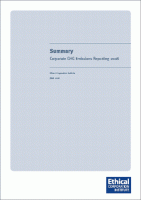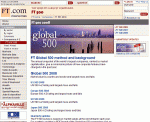

 They are the crème de la crème, the cat’s whiskers, the dog’s … whatsits.
They are the crème de la crème, the cat’s whiskers, the dog’s … whatsits.
They are the best. At the pinnacle of their respective industries they are the global leaders of their time. Superlatives cannot be heaped too highly, one atop the other, to describe how highly these companies are regarded.
They are the FT Global 500: the top 500 worldwide corporations, ranked by according to market value. Few facts about them will surprise you.
For instance: nearly 15% of the companies are Banks, making it the largest sector in the list; and three of the top five companies are Oil & Gas Producers, spanning the USA, Russia and China.
The clout of these companies cannot be over estimated. The combined market value of the top ten Banks and the top three Oil & Gas Producers is over $2.4bn. This makes them more influential as a bloc than the combined FT500 companies of any nation except the USA.
Which is why the latest report by the Ethical Corporation Institute is so disappointing.
Inconsistent Emissions
Based upon the FT500 companies’ responses to the fifth Carbon Disclosure Project, the survey has collated and analysed statistics about how the companies are reporting their greenhouse gas (GHG) emissions.
Their conclusion, published in the Corporate Greenhouse Gas Emissions Reporting 2008 report, is that there is a huge disparity between the methodologies FT500 companies use to calculate their emissions.
For example, 34 different methods were used within the 500, with no consistency being shown by either individual sectors or geographic regions. This makes any comparison between companies, sectors or countries almost impossible to achieve.
In addition only half of those surveyed used a recognised standard to verify their emissions figures and of those using the most widely recognised methodology, the WBCSD/WRI GHG Protocol, less than half had their figures independently verified.
From Peanuts to Financial Performance
On the fiscal side the survey revealed the cost of collecting and independently verifying GHG emission data is around $2m. This is about one hundredth of a percentage of the market value of Henkel, the smallest company in the FT500. To you and me: Peanuts.
Compare this to how the same companies handle their annual accounts. Here they are regulated with most countries following either the Generally Accepted Accounting Principles (GAAP) or the International Financial Reporting Standards (IFRS, formerly the IAS).
In addition, published financial figures have to be independently verified by a competent and recognised auditor. Henkel spent $13m on audit services alone in 2007, six times the hypothetical ceiling for GHG emission figure collation and auditing.
It’s worth pointing out that this comparison confirms the belief that once an area becomes regulated it is immediately more expensive for a company to service.
All the investors questioned in the survey suggested that the companies they invested in were using inadequate standards. Unsurprisingly, they also suggested that those standards could be improved by linking carbon performance reporting with the company’s financials.
Ouch .. as in OUCH!!
This post could end there by echoing the sentiments in Front Seat Sustainability or Squirrels of Sustainability, repeating the need for companies to work together on methodologies and standards in order to stay ahead of regulation.
However, there is a far sharper end to this stick than an in-principle call to arms.
In 2013, four-and-a-half years from now, EU energy producers will start trading carbon emissions under the Emissions Trading Scheme. In addition, UK companies will be subject to the more far-reaching Carbon Reduction Commitment.
Taken together these two initiatives will push up electricity prices by over 40%, according to estimates from the EU and the UK Government. Both are also planning to extend their schemes to cover all major business sectors shortly after 2013.
GHG emissions will suddenly become very expensive and investors, recognising that a non-standard approach is always more risky, are likely to look less favourably upon this bickering over methodologies.
In addition the survey suggests the costs of reporting and auditing emission figures could rise by a factor of six if they become regulated.
In short, businesses need to look urgently at how they report GHG emissions and adopt a standard which is not only transparent and comparable but also accepted amongst their peers.
Those which don’t could find the medium term financial costs will, quite literally, cripple them.
Photo Credit: brianfit
Lucy is Editor at Corporate Eye




